unit10知识点讲解
九年级 unit10 知识要点

unit10一、语法be supposed/expected to do sth.=should do sth二、知识点1.shake hands 2.for the first time 3.greet sb.(in) the wrong way 4.happen to sb.5.as soon as6.with my hand out7.hold out sb’s hand8.to one’s surprise9.find out 10.drop by 11.as…as sb.can=as…as possible 12.make an effort to do sth.=try to do sth.13.aviod doing sth. 14.keep sb. doing sth. 15.make plans to do sth.=plan to do sth. 16.go abroad 17.stick …into18.point at sb.19.go out of one’s way to do sth20.make sb.feel at home21.be comfortabl e doing sth22.imagine (sb’s) doing sth 23.except与besides 24.at home25.have a good year三、句子1.Where I’m from ,we’re pretty relaxed about time.2.There is no reason to be late.3.We value the time we spend with our family and friends in our everyday lives.4.We often just walk around the town center, seeing as many of our friends as we can.unit10一、语法be supposed/expected to do sth.=should do sth二、知识点1.shake hands 2.for the first time 3.greet sb.(in) the wrong way 4.happen to sb.5.as soon as6.with my hand out7.hold out sb’s hand8.to one’s surprise9.find out 10.drop by 11.as…as sb.can=as…as possible 12.make an effort to do sth.=try to do sth.13.aviod doing sth. 14.keep sb. doing sth. 15.make plans to do sth.=plan to do sth. 16.go abroad 17.stick …into18.point at sb.19.go out of one’s way to do sth20.make sb.feel at home21.be comfortable doing sth22.imagine (sb’s) doing sth 23.except与besides 24.at home25.have a good year三、句子1.Where I’m from ,we’re pretty relaxed about time.2.There is no reason to be late.3.We value the time we spend with our family and friends in our everyday lives.4.We often just walk around the town center, seeing as many of our friends as we can.unit10一、语法be supposed/expected to do sth.=should do sth二、知识点1.shake hands 2.for the first time 3.greet sb.(in) the wrong way 4.happen to sb.5.as soon as6.with my hand out7.hold out sb’s hand8.to one’s surprise9.find out 10.drop by 11.as…as sb.can=as…as possible 12.make an effort to do sth.=try to do sth.13.aviod doing sth. 14.keep sb. doing sth. 15.make plans to do sth.=plan to do sth. 16.go abroad 17.stick …into18.point at sb.19.go out of one’s way to do sth20.make sb.feel at home21.be comfortable doing sth22.imagine (sb’s) doing sth 23.except与besides 24.at home25.have a good year三、句子1.Where I’m from ,we’re pretty relaxed about time.2.There is no reason to be late.3.We value the time we spend with our family and friends in our everyday lives.4.We often just walk around the town center, seeing as many of our friends as we can.unit10一、语法be supposed/expected to do sth.=should do sth二、知识点1.shake hands 2.for the first time 3.greet sb.(in) the wrong way 4.happen to sb.5.as soon as6.with my hand out7.hol d out sb’s hand8.to one’s surprise9.find out 10.drop by 11.as…as sb.can=as…as possible 12.make an effort to do sth.=try to do sth.13.aviod doing sth. 14.keep sb. doing sth. 15.make plans to do sth.=plan to do sth. 16.go abroad 17.stick …into18.point at sb.19.go out of one’s way to do sth20.make sb.feel at home21.be comfortable doing sth22.imagine (sb’s) doing sth 23.except与besides 24.at home25.have a good year三、句子1.Where I’m from ,we’re pretty relaxed about time.2.There is no reason to be late.3.We value the time we spend with our family and friends in our everyday lives.4.We often just walk around the town center, seeing as many of our friends as we can.unit10一、语法:应该干某事二、知识点1.握手2.第一次3.用错误的方式问候某人 4.发生在某人身上5.一…就6伸着我的手7.伸出某人的手8.令某人惊奇的是9.发现(经努力).10顺便拜访11.尽可能12.努力干某事13.避免干某事14.一直干某事15.计划干某事16.出国17.将…刺入18.指着某人.19.特地干某事20.使某人感到宾至如归1.自如的干某事22.想象(某人)干某事23.除…之外无/除…之外还有24.在家里/在国内25.一个学年过得愉快三、句子1.我来的地方,我们对于时间是相当宽松的.2.没理由迟到3.我们重视在我们的日常生活中和我们的家人和朋友一起度过的时光4.我们恰恰绕着市中心散步,会见我们尽可能多的朋友.unit10一、语法:应该干某事二、知识点1.握手2.第一次3.用错误的方式问候某人 4.发生在某人身上5.一…就6伸着我的手7.伸出某人的手8.令某人惊奇的是9.发现(经努力).10顺便拜访11.尽可能12.努力干某事13.避免干某事14.一直干某事15.计划干某事16.出国17.将…刺入18.指着某人.19.特地干某事20.使某人感到宾至如归1.自如的干某事22.想象(某人)干某事23.除…之外无/除…之外还有24.在家里/在国内25.一个学年过得愉快三、句子1.我来的地方,我们对于时间是相当宽松的.2.没理由迟到3.我们重视在我们的日常生活中和我们的家人和朋友一起度过的时光4.我们恰恰绕着市中心散步,会见我们尽可能多的朋友.unit10一、语法:应该干某事二、知识点1.握手2.第一次3.用错误的方式问候某人 4.发生在某人身上5.一…就6伸着我的手7.伸出某人的手8.令某人惊奇的是9.发现(经努力).10顺便拜访11.尽可能12.努力干某事13.避免干某事14.一直干某事15.计划干某事16.出国17.将…刺入18.指着某人.19.特地干某事20.使某人感到宾至如归1.自如的干某事22.想象(某人)干某事23.除…之外无/除…之外还有24.在家里/在国内25.一个学年过得愉快三、句子1.我来的地方,我们对于时间是相当宽松的.2.没理由迟到3.我们重视在我们的日常生活中和我们的家人和朋友一起度过的时光4.我们恰恰绕着市中心散步,会见我们尽可能多的朋友.unit10一、语法:应该干某事二、知识点1.握手2.第一次3.用错误的方式问候某人 4.发生在某人身上5.一…就6伸着我的手7.伸出某人的手8.令某人惊奇的是9.发现(经努力).10顺便拜访11.尽可能12.努力干某事13.避免干某事14.一直干某事15.计划干某事16.出国17.将…刺入18.指着某人.19.特地干某事20.使某人感到宾至如归1.自如的干某事22.想象(某人)干某事23.除…之外无/除…之外还有24.在家里/在国内25.一个学年过得愉快三、句子1.我来的地方,我们对于时间是相当宽松的.2.没理由迟到3.我们重视在我们的日常生活中和我们的家人和朋友一起度过的时光4.我们恰恰绕着市中心散步,会见我们尽可能多的朋友.。
人教版八年级英语上册Unit10知识点精讲
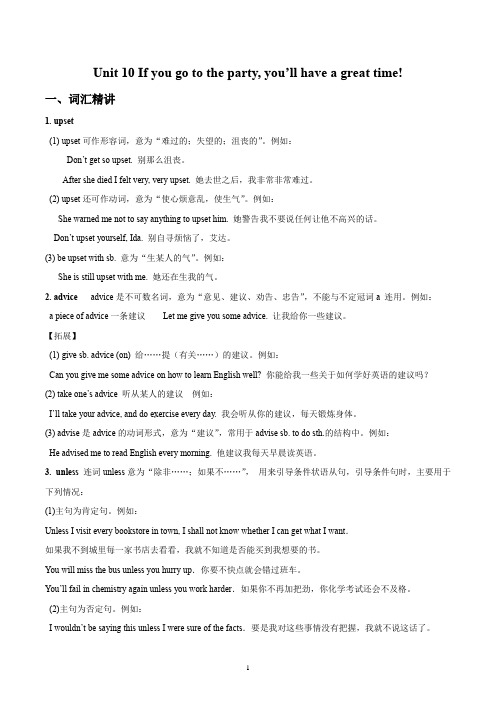
Unit 10 If you go to the party, you’ll have a great time!一、词汇精讲1. upset(1) upset可作形容词,意为“难过的;失望的;沮丧的”。
例如:Don’t get so upset. 别那么沮丧。
After she died I felt very, very upset. 她去世之后,我非常非常难过。
(2) upset还可作动词,意为“使心烦意乱,使生气”。
例如:She warned me not to say anything to upset him. 她警告我不要说任何让他不高兴的话。
Don’t upset yourself, Ida. 别自寻烦恼了,艾达。
(3) be upset with sb. 意为“生某人的气”。
例如:She is still upset with me. 她还在生我的气。
2. advice advice是不可数名词,意为“意见、建议、劝告、忠告”,不能与不定冠词a 连用。
例如:a piece of advice一条建议Let me give you some advice. 让我给你一些建议。
【拓展】(1) give sb. advice (on) 给……提(有关……)的建议。
例如:Can you give me some advice on how to learn English well? 你能给我一些关于如何学好英语的建议吗?(2) take one’s advice 听从某人的建议例如:I’ll take your advice, and do exercise every day. 我会听从你的建议,每天锻炼身体。
(3) advise是advice的动词形式,意为“建议”,常用于advise sb. to do sth.的结构中。
例如:He advised me to read English every morning. 他建议我每天早晨读英语。
九年级英语上册unit10知识要点
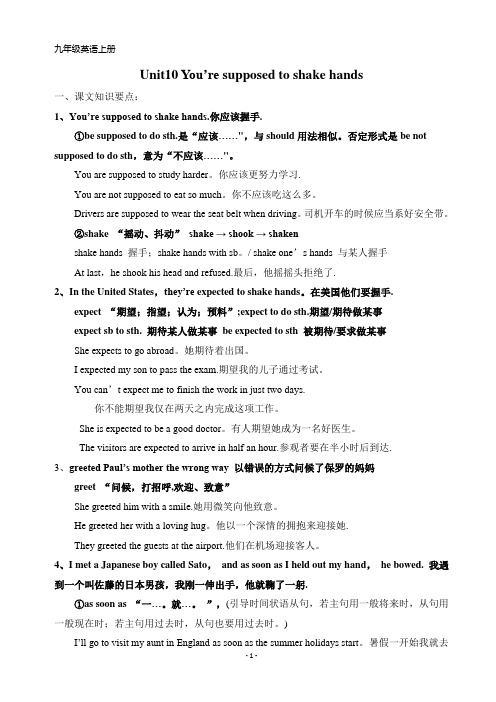
九年级英语上册Unit10 You’re supposed to shake hands一、课文知识要点:1、You’re supposed to shake hands.你应该握手.①be supposed to do sth.是“应该……",与should用法相似。
否定形式是be not supposed to do sth,意为“不应该……"。
You are supposed to study harder。
你应该更努力学习.You are not supposed to eat so much。
你不应该吃这么多。
Drivers are supposed to wear the seat belt when driving。
司机开车的时候应当系好安全带。
②shake “摇动、抖动”shake → shook → shakenshake hands 握手;shake hands with sb。
/ shake one’s hands 与某人握手At last,he shook his head and refused.最后,他摇摇头拒绝了.2、In the United States,they’re expected to shake hands。
在美国他们要握手.expect “期望;指望;认为;预料”;expect to do sth.期望/期待做某事expect sb to sth. 期待某人做某事be expected to sth 被期待/要求做某事She expects to go abroad。
她期待着出国。
I expected my son to pass the exam.期望我的儿子通过考试。
You can’t expect me to finish the work in just two days.你不能期望我仅在两天之内完成这项工作。
She is expected to be a good doctor。
unit 10知识点
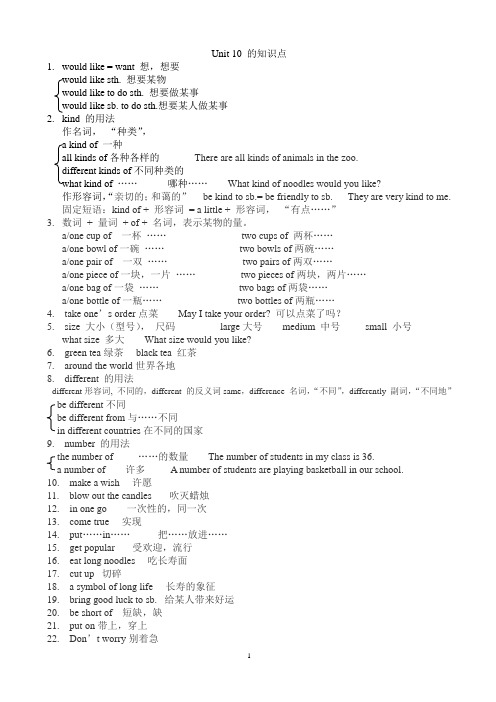
Unit 10 的知识点1.would like = want 想,想要would like sth. 想要某物would like to do sth. 想要做某事would like sb. to do sth.想要某人做某事2.kind 的用法作名词,“种类”,重点句型1.--What would you like ? --I’m not sure yet.yet: 还,仍然。
主要用于否定句和疑问句中。
2. Are there any vegetables in the beef noodles?any: 一些。
用于否定句和疑问句中。
some: 一些。
用于肯定句中。
3. May I take your order? (请问)您可以点菜了吗?4. What kind of noodles would you like? 你想要什么样的面条?What kind of …… ? 用来询问种类,of 后可以接复数名词,也可以接不可数名词。
例: What kind of music do you like?5. Would you like a large bowl?Would you like ……? 你愿意……吗?用于向对方有礼貌的提出建议和请求。
肯定回答:Yes, I’d like to. / Yes , I’d love to.否定回答:No, thanks . / Sorry ,+ 拒绝的理由。
6. What size would you like ? 你想要多大碗的?What size ……? 用来询问大小,尺寸,尺码,意思是: 多大尺寸……?常用 large, medium, small来回答。
例:What size shirt do you want? I want size 36.7. All of these birthday foods may be different.may be :可能是,也许是例: I may be a little late.8. They bring good luck to the birthday person.bring: 带来,拿来。
Unit10 知识要点解析
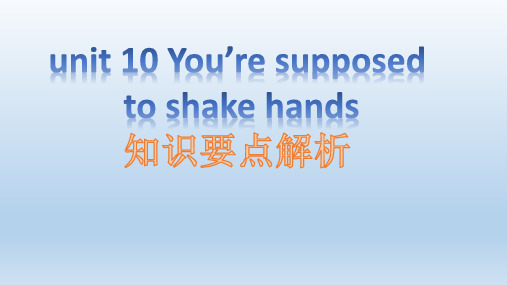
• be worth doing sth 值得做某事,句子主语一般事或物,是do的宾语 • be worth +钱 “值多少钱” • be worth +名词 “值得” • well worth ‘很值得’,不能说 very worth • 【练一练】
_________(握手)with them. • ②当第一次见朋友是,你们应该握手。 • You’re ________ to shake ______ (hand) when you meet your
friends.
3.In the United States, they’re expected to shake hands. 在美国,他们应该握手。
11.If there are people in the meeting room , you are supposed to knock before entering .
• knock v. 敲(门等), 碰撞 • knock at/on the door 敲门 knock into 与......相撞 knock down 撞倒 • 【练一练】用介词at/on,into,down填空 • 1)He knocked ______ the door , but no one answered. • 2)The car knocked ________ the tree last night and the driver hurt. • 3)The boy was knocked ________ by a running bike on the street.
tired.
人教版九年级全一册英语Unit10重点语法知识点总结
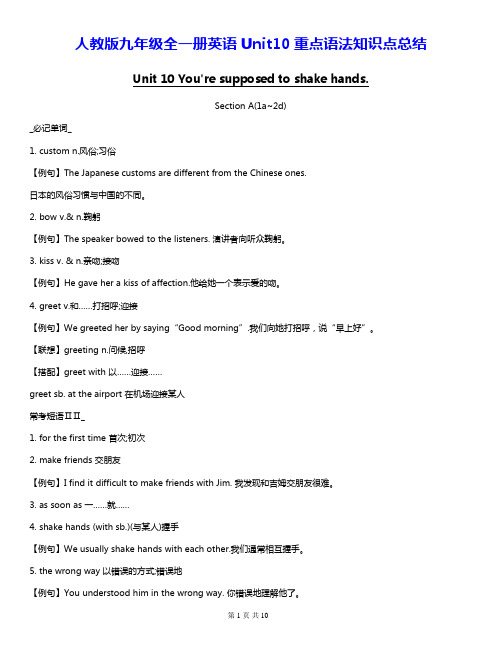
人教版九年级全一册英语Unit10重点语法知识点总结Unit 10 You're supposed to shake hands.Section A(1a~2d)_必记单词_1. custom n.风俗;习俗【例句】The Japanese customs are different from the Chinese ones.日本的风俗习惯与中国的不同。
2. bow v.& n.鞠躬【例句】The speaker bowed to the listeners. 演讲者向听众鞠躬。
3. kiss v. & n.亲吻;接吻【例句】He gave her a kiss of affection.他给她一个表示爱的吻。
4. greet v.和……打招呼;迎接【例句】We greeted her by saying“Good morning”.我们向她打招呼,说“早上好”。
【联想】greeting n.问候,招呼【搭配】greet with 以……迎接……greet sb. at the airport 在机场迎接某人常考短语ⅡⅡ_1. for the first time 首次;初次2. make friends 交朋友【例句】I find it difficult to make friends with Jim. 我发现和吉姆交朋友很难。
3. as soon as 一……就……4. shake hands (with sb.)(与某人)握手【例句】We usually shake hands with each other.我们通常相互握手。
5. the wrong way 以错误的方式;错误地【例句】You understood him in the wrong way. 你错误地理解他了。
6. hold out 伸出(手等)7. greet each other 互相问候8. to one’s surprise 令某人惊讶的是经典句型ⅢⅡ1. That's how people in Japan are expected to greet each other.那就是在日本人们互相问候的方式。
Unit10_I'd_like_some_noodles_知识点

I’d like some noodles一.重点词汇1.可数noodles:面条potatoes:土豆tomatoes:西红柿vegetables:蔬菜carrots:胡萝卜onions:洋葱dumplings:饺子pancakes:薄饼2.不可数mutton:羊肉beef:牛肉meat:肉porridge:稀饭Soup:汤milk:牛奶Water:水3.有时可数有时不可数chicken:鸡肉cabbage:卷心菜fish:鱼二.重点短语would like:愿意,喜欢a large bowl of :一大碗two bowls of :两碗what kind of :哪种?Blow out:吹灭Make a wish:许愿Bring good luck to : 给。
带来好运Cut up:切get popular:受欢迎三.重点句型1.-- What would you like?-- I'd like beef noodles, please.2.--What kind of noodles would you like?-- I'd like the beef noodles, please.3.May I take your order? 我能拿走你的菜单吗?4.--What size would you like? 你想要多大的?--I’d like a large bowl, please.5.--Is there any meet in the tomato and egg soup?No, there isn’t any.四.重点知识1、Would like的用法2.1 would like 意为想要,愿意,相当于want,用于提出要求或建议;但语气比want委婉,一般有一下三种形式:①would like sth. 想要某物后接名词不加to如:我想要些冰淇淋I would like some ice cream.②would like to do sth. 想要干某事后跟动词,加to如:我想要和你一起去。
人教版英语八年级unit10知识点全解
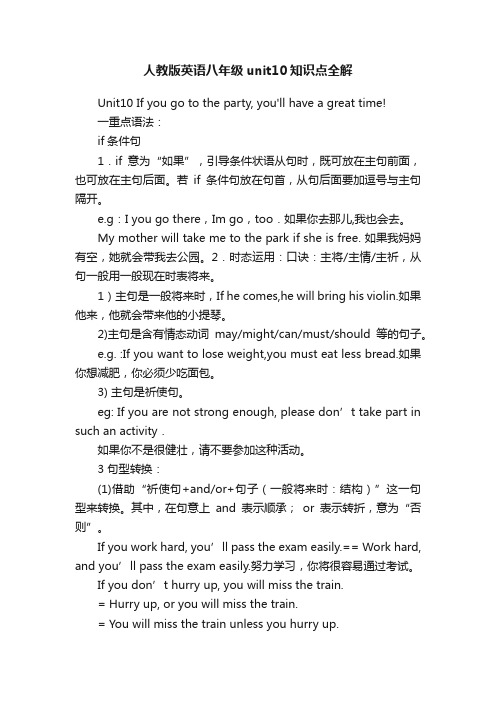
人教版英语八年级unit10知识点全解Unit10 If you go to the party, you'll have a great time!一重点语法:if条件句1.if意为“如果”,引导条件状语从句时,既可放在主句前面,也可放在主句后面。
若if条件句放在句首,从句后面要加逗号与主句隔开。
e.g:I you go there,Im go,too.如果你去那儿,我也会去。
My mother will take me to the park if she is free. 如果我妈妈有空,她就会带我去公园。
2.时态运用:口诀:主将/主情/主祈,从句一般用一般现在时表将来。
1)主句是一般将来时,If he comes,he will bring his violin.如果他来,他就会带来他的小提琴。
2)主句是含有情态动词may/might/can/must/should等的句子。
e.g. :If you want to lose weight,you must eat less bread.如果你想减肥,你必须少吃面包。
3) 主句是祈使句。
eg: If you are not strong enough, please don’t take part in such an activity.如果你不是很健壮,请不要参加这种活动。
3 句型转换:(1)借助“祈使句+and/or+句子(一般将来时:结构)”这一句型来转换。
其中,在句意上and表示顺承;or表示转折,意为“否则”。
If you work hard, you’ll pass the exam easily.== Work hard, and you’ll pass the exam easily.努力学习,你将很容易通过考试。
If you don’t hurry up, you will miss the train.= Hurry up, or you will miss the train.= You will miss the train unless you hurry up.如果你不快点,你会错过火车。
- 1、下载文档前请自行甄别文档内容的完整性,平台不提供额外的编辑、内容补充、找答案等附加服务。
- 2、"仅部分预览"的文档,不可在线预览部分如存在完整性等问题,可反馈申请退款(可完整预览的文档不适用该条件!)。
- 3、如文档侵犯您的权益,请联系客服反馈,我们会尽快为您处理(人工客服工作时间:9:00-18:30)。
知识点讲解:
P63 ,3a:
1, or (1) “或者”,连词,用来连接并列的单词或词组,表示选择关系。
Is he your brother or your friend?
(2) 在否定句和疑问句中替换and.
2, then 然后,He speaks English, and then he plays the piano.
3, be in 相当于join, 加入到…中, 成为…中的一员
I want to be in the school trip.
Tom is in the swimming club.
4, call sb. at …
P63, 4
1, show 1) 名词,演出,表演。
school show 学校公演
be on show …在展览中The photos are on show.
2)动词,给…看,出示show sb. sth. = show sth. to sb.
Please show me your watch. = Please show your watch to me.
2, do Chinese kung fu 表演中国功夫
3, Sunday 星期天,是一周的第一天,在星期天on Sunday;
这个星期天this Sunday (之前不加on)
4, pm\p.m. 指下午;am\a.m. 指上午,均放在具体时间之后。
P64, 3
1, May I know your name? 你叫什么名字?(语气更委婉,更有礼貌)
= May I have your name? = What’s your name?
may 情态动词,可以。
You may go now.
2, draw 动词,画画。
draw a cat
3, a little (1) 修饰动词,“一点”,放在动词之后,做状语。
反义短语a lot.
I know a little/a lot about the boy.
(2) 修饰不可数名词,“一些”,放在不可数名词之前。
a little ice cream 一些冰激凌
4, e-mail = email 可数名词,an e-mail/e-mails
5, address 可数名词,an address/addresses What’s your address?
6, a lot修饰动词,“大量”,放在动词之后,做状语。
反义短语a little
Thanks a lot. Learn a lot about Chinese history.
7, why 为什么,是特殊疑问词,提问原因(because…)。
和其他特殊疑问词一样,Why 后面必须跟一般疑问句。
Why do you want to join the swimming club?
Why is he good at English?。
